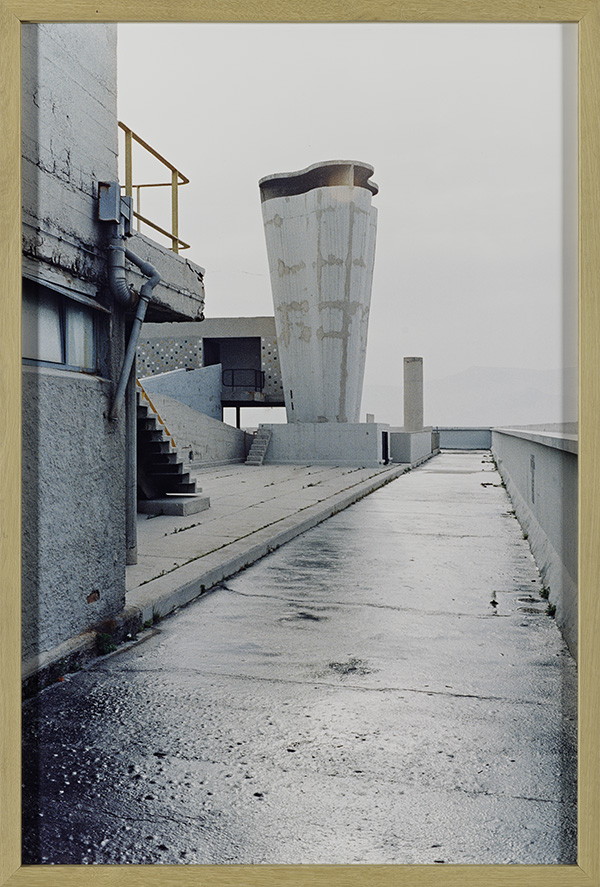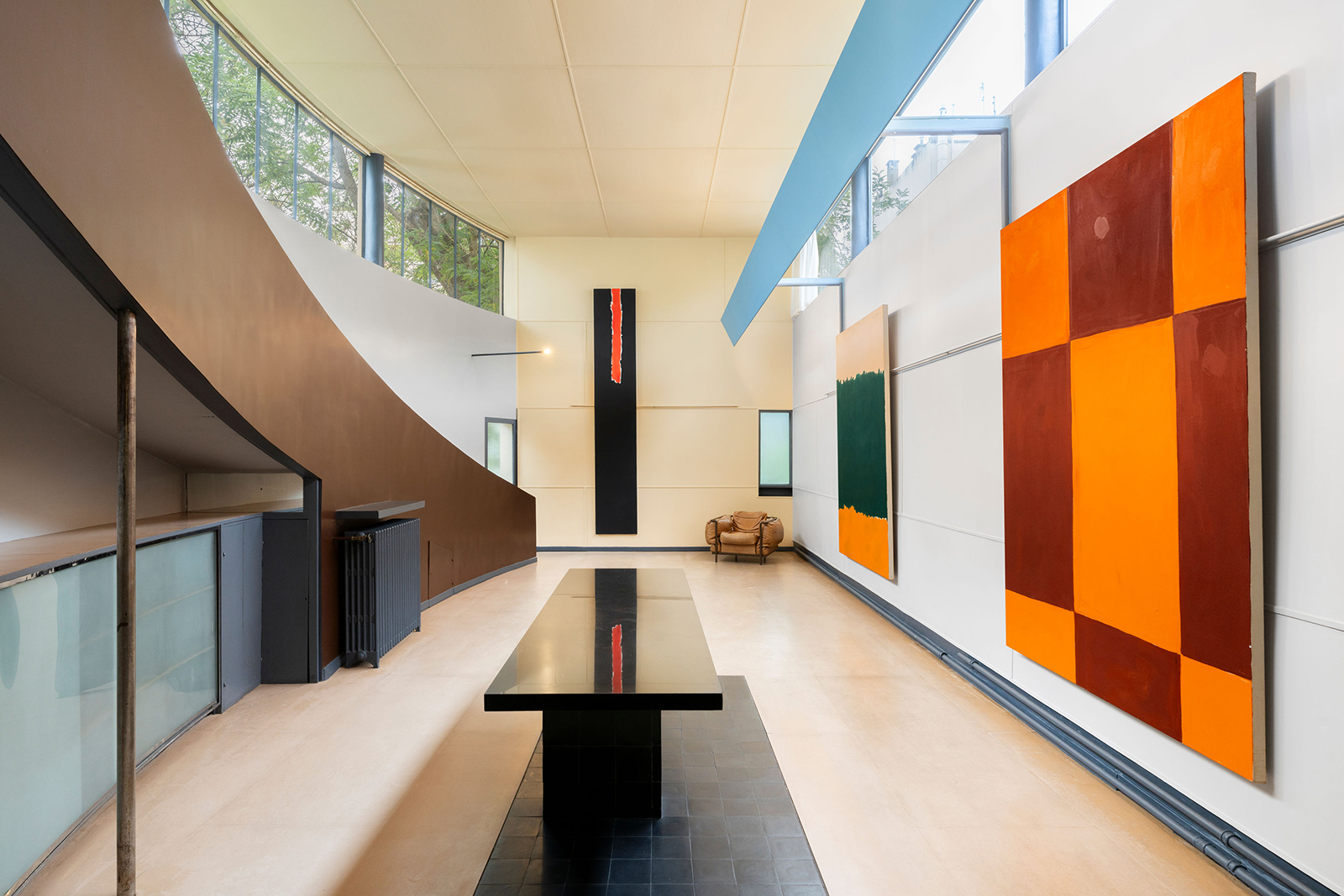

Günther Förg
Le moderne
October 16 — December 14, 2024
Fondation Le Corbusier and Almine Rech are pleased to present Le moderne, Günther Förg’s solo exhibition at Maison La Roche in Paris, on view from October 16 to December 14, 2024.
Günther Förg always expressed a complicated and profound relationship to architecture through his work, exploring the connections between abstraction, space, and architecture.
He drew on the formal vocabulary of modernism, both in painting and architecture. His abstract, often monochromatic works were sometimes structured by geometrical lines and blocks of color recalling the principles of order and simplicity associated with architectural movements such as Bauhaus or International Style.
As such, there could be no better setting to show his work than Maison La Roche, designed and built in the early 1920s by Le Corbusier. The house is named after its patron and owner, Raoul La Roche, a banker and collector of cubist and modern art. His collection, most of which was selected by Le Corbusier and the painter Amédée Ozenfant, included paintings by artists such as Juan Gris, Picasso, and Fernand Léger.
The building’s architecture is divided into two parts: a gallery for La Roche’s painting collection and his private living area. The attached Maison Jeanneret was built for Le Corbusier’s brother and his family. Beginning in the 1970s, Maison La Roche and Maison Jeanneret were restored and are now listed as historical monuments on the UNESCO World Heritage list.
The original colors of the interior walls, which were rediscovered during restoration in 2008 and 2009, are an early attempt at the “architectural polychromy”, developed by Le Corbusier throughout his work. He did not see color simply as a decorative element, but as an essential architectural component that could transform spaces, influence perception, and structure the environment. He often included wall paintings in his buildings as part of this concept of architectural polychromy.
When he was a student at the Academy of Fine Arts in Munich in the late 1970s, Günther Förg began to make monochromatic wall paintings in various colors according to the places where they appeared. From the beginning, he connected his artistic practice to an environment, making architecture one of the essential elements of his work in order to rethink the context of the exhibition space and that of twentieth-century art in general.
In his studio, Förg liked to surround himself with models that he used to design his future commissions for architectural spaces. A doll house builder constructed these for him. The exhibition features two examples of these miniatures of two unrealized projects. The models shown here, one from 1998 and the other from 2010, display proposed wall paintings for exhibition spaces, including one for the exhibition Permanent Trouble at the Kopp Collection.
The connection between Günther Förg’s paintings and Le Corbusier’s architectural polychromy lies most of all in their shared approach to color, their use of monochrome, and their way of using color to structure the space and interact with the architecture.
Although he was not a direct disciple of Le Corbusier, Förg referenced him directly in some of his work. For instance, in the 1980s, he began photographing postwar modernist architecture, with examples of the influence of Bauhaus in Israel or that of fascism in Italy. He photographed several iconic buildings by Walter Gropius and Le Corbusier, such as the Cité Radieuse in Marseille, of which there is an example in the exhibition, and the Chapelle Notre-Dame-du-Haut in Ronchamp. However, unlike architectural photographs that capture smooth, idealized images, Förg was interested in raw materiality, in deterioration and traces left by time. His photos highlight details like the texture of the concrete, the corrosion of the materials, and the patina of the buildings, emphasizing a certain fragility and humanity in Le Corbusier’s work. These framed large-scale photographs are placed against the wall on the floor, as if in the artist’s studio, in order to accentuate their sculptural aspect.
Designed with the Estate of Günther Förg, this exhibition also displays paintings from the last part of the artist’s life, between 1994 and 2006. In the 2000s, Günther Förg’s painting changed, turning away from minimalism for a more expressionist, gestural style with a graph-like aspect recalling the paintings of Cy Twombly. All these works are painted in acrylic, a medium that imposes a certain energy, because it dries quickly, requiring rapid execution and offering little margin for error.
These medium-sized paintings exhibited on the blue or green walls of the villa use a palette of colors including brown, green, and black and refer to great modernist figures such as Edvard Munch, Piet Mondrian, Paul Klee, and Barnett Newman, who constitute the artist’s pantheon.
This is the first time that Günther Förg’s work has been shown in a domestic space.1 The connection between Günther Förg’s painting and Le Corbusier’s architectural polychromy is based on a shared understanding of color as a structural element of space. For Le Corbusier, color, like light, was a functional and aesthetic tool to organize architectural spaces, while Förg continued this exploration in the field of abstract art, questioning it from a critical perspective. Although Förg adopted the formal principles of modernism, he deconstructed the ideals of perfection, order, and purity through his painting.
— Nicolas Trembley, curator & art critic
1. Except for the group exhibition ‘Chambres d’amis‘ in 1986, in which the artists were invited by curator Jan Hoet to show their work outside the museum in private homes in Ghent, Belgium.
Günther Förg
1952-2013
Günther Förg, born in 1952 in Allgäu, Germany, began his artistic career in the early 1970s at The Academy of Fine Art Munich where he was influenced by Blinky Palermo. Förg initially focused on grey and black monochrome paintings, which laid the groundwork for his lifelong commitment to conceptualism. He viewed grey as a neutral base, neither white nor black, free from the constraints of figuration. After his early monochromatic paintings, Förg continued to explore modernist themes from postmodern perspectives. Despite his exploration of various media, including sculpture, ceramics, and photography, painting remained his most important expressive medium. His extensive body of work has been exhibited in prestigious institutions, including the Museum of Modern Art in San Francisco, the Musée d’Art Moderne de Ville de Paris, the Reina Sofia Museum in Madrid, the Fondation Beyeler in Basel, and the Stedelijk Museum in Amsterdam.
In the 1980s, Förg expanded his practice to large-format photography, capturing culturally and politically significant architectural structures from Tel Aviv to Moscow. This period marked a temporary departure from painting, as he explored photography as a closer representation of reality. His photographic works gained international acclaim, exhibited in major museums like Kunsthalle Bern in Switzerland and The Solomon R. Guggenheim Museum in New York.
Förg returned to painting in the late 1980s, incorporating new materials such as wood, copper, bronze, and lead. His lead series, with acrylic on sheets of lead supported by wooden frames, blurred the line between painting and sculpture. His bronze sculptures from this period also displayed a painterly quality, with textures reminiscent of brushstrokes.
By the 21st century, Förg’s paintings evolved beyond Minimalism, featuring a brighter palette and expressive marks. His mastery of color to create space and form opened new insights in his painting. Works from this era, such as the Gitterbilder (grid paintings), showcased vibrant colors and gestural hatching, drawing comparisons to Cy Twombly, Mark Rothko, and Paul Klee. Förg’s later works appropriated older strategies of picture-making, presenting them afresh and indicating a synthesis of his experimental journey, rooted in art history. As he put it, ‘painting is a resilient practice; it remains ever-present and unchanging through history.’

L’exposition est présentée dans le cadre de À Paris pendant Paris Photo
